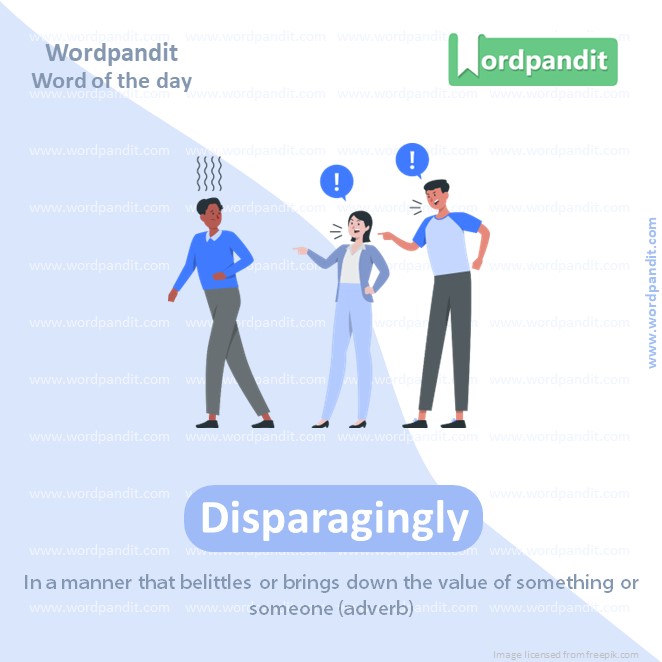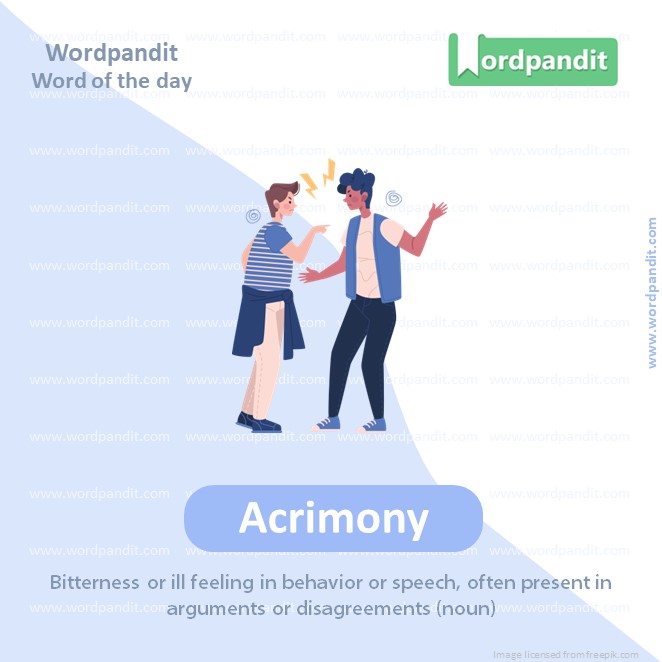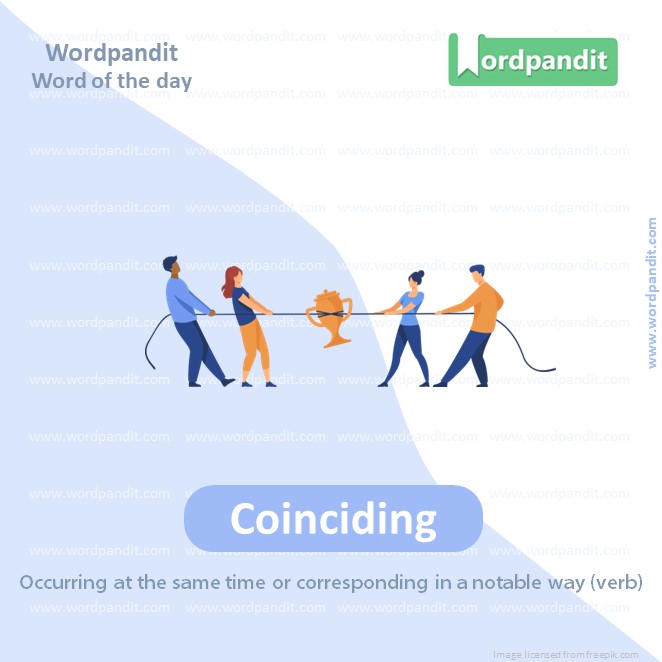Daily Vocabulary Words: List of Daily Used Words
Hi there. Welcome to this special section @ Wordpandit.
Our endeavour here is straightforward: highlighting important daily vocabulary words, you would encounter in The Hindu. This is your repository of commonly used words; essentially, we are posting a list of daily used words. Hence, this has significant practical application as it teaches you words that are commonly used in a leading publication such as The Hindu.
Visit the website daily to learn words from The Hindu.

WORD 1: Disparagingly
CONTEXT: To speak disparagingly of fellow beings for their beliefs, food habits, or cultural practices is nothing short of bigotry.
SOURCE: The Hindu
EXPLANATORY PARAGRAPH: Imagine you’re drawing a picture, and someone looks at it and says, “That’s a bad drawing.” When they say that in a way that makes you feel your drawing isn’t good, they are speaking disparagingly. They’re not being nice or encouraging; instead, they’re making you feel bad about your work.
MEANING: In a manner that belittles or brings down the value of something or someone (adverb).
PRONUNCIATION: dis-PAR-uh-jing-lee
SYNONYMS: Scornfully, Derogatorily, Disdainfully, Contemptuously, Disrespectfully, Pejoratively.
USAGE EXAMPLES:
1. The teacher spoke disparagingly about the student’s effort, which made him feel discouraged.
2. Critics often comment disparagingly on new movies, focusing on the negatives.
3. He spoke disparagingly of his rival’s achievements, trying to make them seem unimportant.
4. Her friends talked disparagingly about her choice in fashion, making her doubt her style.
WORD 2: Consolidation
CONTEXT: Nation makers grappled with these challenges of imbalances and diversity, to set in motion the consolidation of the most diverse, and most populated democratic country on the planet.
SOURCE: The Hindu
EXPLANATORY PARAGRAPH: Think about when you clean your room and put all your toys in one box instead of having them all over the place. Consolidation is like that. It’s when you bring things together to make them more organized or stronger. Like combining small piles of blocks into one big pile.
MEANING: The act of combining multiple elements into a single, more effective or coherent structure (noun).
PRONUNCIATION: con-soh-li-DAY-shun
SYNONYMS: Merger, Unification, Integration, Amalgamation, Fusion, Centralization.
USAGE EXAMPLES:
1. The consolidation of the two companies created a more powerful business.
2. By consolidation, the small farms became a single large one.
3. The consolidation of her ideas into one theory helped her write a better research paper.
4. The school’s consolidation of resources led to better educational tools for students.

WORD 3: Acrimony
CONTEXT: These trends need to be reconciled in a manner that helps the progress of the
country, rather than becoming a source of acrimony.
SOURCE: The Hindu
EXPLANATORY PARAGRAPH: Acrimony is like when you and your friend are really mad at each other and say mean things. It’s a strong feeling of anger, bitterness, or dislike between people, especially when they argue or don’t get along.
MEANING: Bitterness or ill feeling in behavior or speech, often present in arguments or disagreements (noun).
PRONUNCIATION: AK-ri-moh-nee
SYNONYMS: Bitterness, Resentment, Animosity, Hostility, Ill will, Rancor.
USAGE EXAMPLES:
1. The discussion ended in acrimony, with both sides angry at each other.
2. There was a sense of acrimony in the room after the heated debate.
3. His acrimonious remarks made the conversation uncomfortable.
4. The divorce was filled with acrimony and disagreements.
WORD 4: Delimitation
CONTEXT: There is also a danger that these challenges can accelerate with the impending
nation-wide delimitation of Lok Sabha constituencies and the growing gaps in development between regions, and communities.
SOURCE: The Hindu
EXPLANATORY PARAGRAPH: Delimitation is like when you draw a line around your part of the
sandbox so that your friends know where your area is. It’s making clear boundaries or limits for something, so people know where something starts and ends.
MEANING: The process of fixing or marking the boundaries or limits of something (noun).
PRONUNCIATION: dee-lim-i-TAY-shun
SYNONYMS: Demarcation, Boundary setting, Limitation, Definition, Bordering, Confinement.
USAGE EXAMPLES:
1. The delimitation of the garden area was done with a small fence.
2. There was a clear delimitation between the two properties.
3. The project needed delimitation to understand its scope and limits.
4. Delimitation of responsibilities helped team members understand their roles.

WORD 5: Evocatively
CONTEXT: Few barometers measure the climate crisis as evocatively as the state of glaciers, a key component of the cryosphere.
SOURCE: The Hindu
EXPLANATORY PARAGRAPH: When something is evocative, it’s like when you smell cookies baking and it makes you think of baking with your grandma. Evocatively means causing you to have a strong feeling or memory about something, often something nice or interesting.
MEANING: In a manner that brings strong images, memories, or feelings to mind (adverb).
PRONUNCIATION: ee-VOH-kuh-tiv-lee
SYNONYMS: Suggestively, Reminiscently, Vividly, Impressively, Poignantly, Stirringly.
USAGE EXAMPLES:
1. The old photographs spoke evocatively of a time long past.
2. The music was evocatively reminiscent of her childhood.
3. She described the scene evocatively, making everyone feel as if they were there.
4. The author writes evocatively, drawing the reader into the story.

WORD 6: Coinciding
CONTEXT: The creation of eras, such as Vikrami, Shaka, and Ilahi or the era of piety in Islam coinciding with the Prophet and the first four caliphs and the steady decline afterwards were among many other modes.
SOURCE: The Hindu
EXPLANATORY PARAGRAPH: Coinciding is like when you and your friend decide to wear the same
color shirt on the same day without planning it. It means happening at the same time or being in the same place or having the same idea by chance.
MEANING: Occurring at the same time or corresponding in a notable way (verb).
PRONUNCIATION: koh-in-SY-ding
SYNONYMS: Concurrent, Simultaneous, Synchronous, Coexistent, Overlapping, Corresponding.
USAGE EXAMPLES:
1. The two events coinciding caused a scheduling conflict.
2. Their ideas were coinciding, leading to a great collaboration.
3. It was a coincidence that their vacations were coinciding.
4. The simultaneous holidays were coinciding this year, making it extra special.

WORD 7: Enlightenment
CONTEXT: the “Dark Age” from which Europe was progressing into Enlightenment.
SOURCE: The Hindu
EXPLANATORY PARAGRAPH: Enlightenment is like when you suddenly understand something that was
confusing before. Imagine figuring out how to solve a difficult puzzle, and you feel really smart and happy. That’s like enlightenment, where you gain new understanding or knowledge.
MEANING: The state of gaining new insight, understanding, or knowledge, often in a spiritual
or intellectual context (noun).
PRONUNCIATION: en-LYT-n-muhnt
SYNONYMS: Awareness, Understanding, Insight, Knowledge, Revelation, Illumination.
USAGE EXAMPLES:
1. Reading the book led to a sense of enlightenment about the subject.
2. His travels contributed to his personal enlightenment.
3. The lecture provided enlightenment on the complex topic.
4. Seeking enlightenment, she turned to meditation and study.
WORD 8: Inflation
CONTEXT: “The indication of political stability after the 2024 General elections, strong growth momentum in the Indian economy, inflation cooling off, steady decline in U.S. bond yields.
SOURCE: The Hindu
EXPLANATORY PARAGRAPH: Inflation is like when you go to the store, and the price of your favorite candy is higher than it was last time. It means things cost more money than they used to, and sometimes people’s money can buy less stuff than before.
MEANING: The increase in prices and decline in the purchasing value of money (noun).
PRONUNCIATION: in-FLAY-shun
SYNONYMS: Price increase, Devaluation, Cost escalation, Economic expansion, Price rise, Upsurge.
USAGE EXAMPLES:
1. Inflation made it harder to afford groceries.
2. The government was concerned about the rapid inflation.
3. High inflation affected the overall economy.
4. People were saving more due to the fear of inflation.
WORD 9: Devastation
CONTEXT: several weather events in November and December set the bar low for Chennai, as extensive devastation wrecked most parts of the city. As a result, every monsoon will invoke the spirit and memories of 2015
SOURCE: The Hindu
EXPLANATORY PARAGRAPH: Devastation is like feeling really, really sad and upset, like when your favorite toy breaks. It’s a big word that means a lot of damage or destruction, or feeling very sad and shocked because something bad has happened.
MEANING: Severe destruction, damage or overwhelming shock and grief (noun).
PRONUNCIATION: dev-uh-STAY-shun
SYNONYMS: Destruction, Ruin, Desolation, Wreckage, Annihilation, Havoc.
USAGE EXAMPLES:
1. The hurricane left devastation in its wake.
2. She felt devastation when she lost her beloved pet.
3. The news of the accident caused widespread devastation.
4. The war brought about the devastation of the entire region.
WORD 10: Prospering
CONTEXT: In his address at a National Human Rights Commission (NHRC) event marking Human Rights Day at Bharat Mandapam, he also said that no part of the globe is so “blossoming, prospering with human rights as our country”.
SOURCE: The Hindu
EXPLANATORY PARAGRAPH: Prospering is like when your garden grows lots of flowers and vegetables because you took good care of it. It means doing really well, being successful, or growing strong and healthy.
MEANING: Doing well or being successful and thriving, especially in financial terms (verb).
PRONUNCIATION: PROS-puh-ring
SYNONYMS: Thriving, Flourishing, Succeeding, Booming, Blossoming, Advancing.
USAGE EXAMPLES:
1. Her business was prospering, reaching new heights every year.
2. The small town began prospering after the new factory opened.
3. He was prospering in his new career as a writer.
4. The favorable weather conditions helped the crops prosper.
vocabulary NDA
Understanding the Vocabulary NDA (Non-disclosure Agreement) is a crucial step in the world of business and law. These terms are not just a compilation of complex words, but a key to decoding legal implications that could affect your business.
Essentially, the Vocabulary NDA refers to the specific set of terms and phrases typically present in a non-disclosure agreement. Broadening your knowledge on this could significantly enhance your comprehension, allowing you to navigate the legal landscape more smoothly.
Mastering the vocabulary NDA starts by contextualizing. While it may sound highly technical, relating each term to real-world scenarios greatly facilitates one’s learning process. Realize that the words in the vocabulary NDA are not arbitrary; they align with certain legal concepts, circumstances, and proceedings.
Secondly, repetition plays an integral role. Regular exposure to the vocabulary NDA strengthens one’s memory, promoting the retention of information. Consider engaging in relevant discussions, reading articles, listening to podcasts, or even simply reviewing a non-disclosure agreement. This repetitive interaction ultimately ingrains the vocabulary NDA into one’s cognitive system.
The vocabulary NDA becomes less intimidating through practical application. It’s essential to apply these terms in actual situations – be it drafting your own NDA, or merely examining an existing one. This invites an in-depth understanding, making the vocabulary NDA more familiar and comprehensible.
Lastly, remember to continuously expand and refine the vocabulary NDA. Legal terminologies evolve, and so should your lexical prowess. Stay updated with new terms and modifications in law that could modify the existing vocabulary NDA.
To sum it up, learning the vocabulary NDA requires relatability, repetition, practical application, and continuous learning. Leverage these strategies, and break your barriers to legal fluency. Unfurl the complexities of the vocabulary NDA, for it’s a secret tool in your success arsenal.













